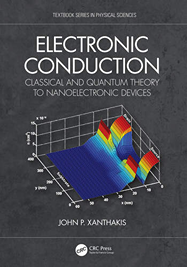Electronic Conduction Classical and Quantum Theory to Nanoelectronic Devices
Material type: TextLanguage: English Series: Textbook Series in Physical SciencesPublication details: Boca Raton, FL : CRC Press, c2021Edition: 1stDescription: xiii, 296 p. : illISBN:
TextLanguage: English Series: Textbook Series in Physical SciencesPublication details: Boca Raton, FL : CRC Press, c2021Edition: 1stDescription: xiii, 296 p. : illISBN: - 9780367639198
- 537.62 XAN
| Item type | Current library | Collection | Shelving location | Call number | Copy number | Status | Date due | Barcode |
|---|---|---|---|---|---|---|---|---|
 Lending Collection
Lending Collection
|
Circulation Section | Department of Electronic Engineering | Circulation Section | 537.62 XAN | 2023-2024 | Available | 98502 |
Biography
John P. Xanthakis obtained his PhD from the Electrical Engineering Department of Imperial College, University of London in 1980. After a period as a post-doctoral fellow at the Mathematics Department of Imperial College he obtained a lectureship at the National Technical University of Athens (NTUA) in 1985. In 1992 - 93 he spent the academic year at Imperial College on sabbatical leave. He was promoted to Professor at NTUA in 1999. He has 50+ papers in peer-reviewed journals and numerous presentations in International Conferences. He is a Senior Member of IEEE, a member of the New York Academy of Sciences and a regular reviewer in many top journals. His main interest is in nanoelectronics, in particular vacuum nanoelectronics.
SUMMARY
Electronic Conduction: Classical and Quantum Theory to Nanoelectronic Devices provides a concise, complete introduction to the fundamental principles of electronic conduction in microelectronic and nanoelectronic devices, with an emphasis on integrating the quantum aspects of conduction.
The chapter coverage begins by presenting the classical theory of conduction, including introductory chapters on quantum mechanics and the solid state, then moving to a complete presentation of essential theory for understanding modern electronic devices. The author’s unique approach is applicable to microscale and nanoscale device simulation, which is particularly timely given the explosion in the nanoelectronics field.
Features
Self-contained
Gives a complete account of classical and quantum aspects of conduction in nanometer scale devices
Emphasises core principles, the book can be useful to electrical engineers and material scientists, and no prior course in semiconductors is necessary
Highlights the bridge to modern electronics, first presenting the physics, and then the engineering complications related to quantum behaviour
Includes many clear, illustrative diagrams and chapter problem sets
Gives an account of post-Silicon devices such as the GaAs MOSFET, the CNT-FET and the vacuum transistor
Showcases why quantum mechanics is necessary with modern devices due to their size and corresponding electron transport properties
Discusses all the issues that will enable readers to conduct their own research
